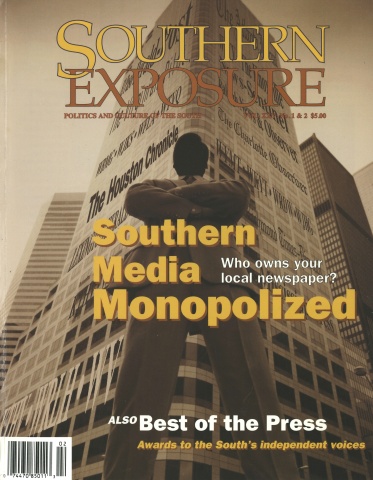Best of the Press

This article originally appeared in Southern Exposure Vol. 25 No. 1/2, "Southern Media Monopolized." Find more from that issue here.
In 1996, many critics proclaimed investigative journalism dead. They noted that in the previous year several media organizations — most notably CBS’s 60 minutes and ABC News — backed down from controversial stories in the face of possible lawsuits.
In other news, ABC lost in court to Food Lion. In a unique move, Food Lion didn’t challenge the legitimacy of the news accounts, which said the company sold out of date and tainted meat to its customers. Instead the company sued two ABC news producers, who had gotten jobs at Food Lion under false pretenses, for fraud and trespassing.
Four of the nation’s largest newspapers, the Washington Post, New York Times, Los Angeles Times and Baltimore Sun, attacked the reporting of the San Jose Mercury News for a series that ran in the paper linking a CIA trained army in South America to drug trafficking in California.
Other examples of the media flinching in the face of controversy abound.
Much of the decline in investigative journalism, however, was attributed to the increasing consolidation of media companies. This, critics say, puts the focus more on profits than in-depth reporting, which is often costly, time-consuming and rarely profitable.
Fortunately, all is not lost. As the winners of this year’s Southern Journalism Awards show, investigative journalism is alive and well.
Each year Southern Exposure and our publisher, the Institute for Southern Studies, honor those reporters whose stories broaden the range of issues, voices and sources in the region’s daily newspapers. By asking tough, imaginative questions and by probing untapped sources of information, these writers show how the media can analyze a community’s problems and contribute to positive change.
This year we celebrate the tenth year of the Southern Journalism Awards. From nearly 100 entries in two categories—investigative journalism and working people—winners were selected in three divisions based on the size of the newspaper’s circulation.
Our panel of judges included journalism professors, magazine and newspaper editors, reporters, authors and community leaders. Our thanks to: Bill Adler, Lane Windham, Loretta Ross, Cynthia Martin, Michael Yellin, Marc Miller, Becci Robbins, Bertie Howard, Nan Freeland, Pat Arnow, Jordan Green, Pronita Gupta, David Kirsh, Michael King and Nayo Watkins.
We are pleased to present excerpts from the first-place winners in this special section. Their power and perspectives extend well beyond the readership of their hometown paper, touching on issues of importance to all of us who consider the South home.
While it is true that media organizations in the South, like their national counterparts, are increasingly concentrated in fewer and fewer hands (see “Who Owns The Southern Media” p.10), it’s still good to know that there are editors and reporters in the South who continue to fulfill the, media’s traditional role of watchdog.
Tags
Ron Nixon
Ron Nixon is the former co-editor of Southern Exposure and was a longtime contributor. He later worked as the homeland security correspondent for the New York Times and is now the Vice President, News and Head of Investigations, Enterprise, Partnerships and Grants at the Associated Press.